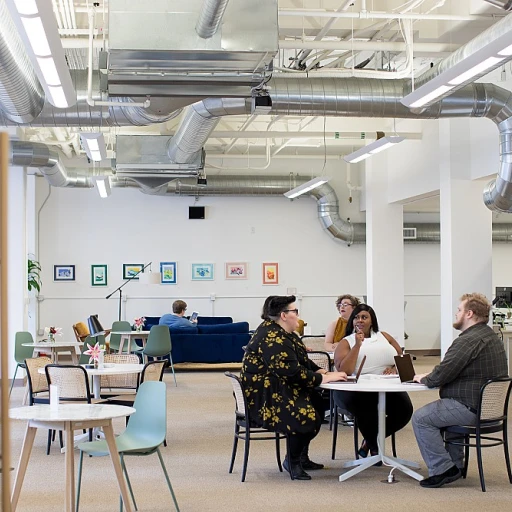
Understanding the purpose of interview questions
Why Interview Questions Matter in the Hiring Process
Interview questions are at the heart of every job interview. They are not just a formality; they help hiring managers and teams understand if a candidate is the right fit for a position. The questions you ask can reveal a lot about a candidate’s skills, experience, and attitude toward work. Well-crafted questions will help you identify the best candidates and avoid costly hiring mistakes.
What Good Questions Achieve
When you design interview questions with purpose, you get more than just surface-level answers. You gain insights into how a candidate thinks, solves problems, and interacts with others. This is especially important for roles that require strong communication skills or teamwork. Good questions will help you:
- Assess both hard and soft skills relevant to the job
- Understand how a candidate’s experience matches the role
- Evaluate cultural fit and alignment with company values
- Spot red flags early in the interview process
- Compare candidates fairly and consistently
Connecting Questions to Company Needs
Every company and team is unique, so your interview questions should reflect your specific needs. Think about what makes your company culture special and what skills are most important for success in the role. For example, if your team values collaboration, you might focus on questions that reveal a candidate’s ability to work with others. If the position requires problem-solving, you’ll want to ask questions that test those skills directly.
It’s also important to avoid common interview mistakes, like asking questions that are too generic or irrelevant. The right questions will help you get beyond rehearsed answers and see how candidates might perform in real situations. If you’re looking for inspiration on what to ask, check out this guide on key questions to ask during an internal promotion interview.
Setting the Stage for the Rest of the Interview
Understanding the purpose behind each question sets the tone for the entire interview. It helps candidates feel that the process is fair and focused, which can encourage more honest and thoughtful answers. As you move forward, consider how different types of questions—behavioral, situational, and those that assess culture fit—can help you get a complete picture of each candidate. This approach will help you make the best hiring decisions for your team and company.
Types of questions to avoid during interviews
Recognizing Interview Questions That Can Backfire
When preparing for a job interview, it’s crucial for hiring managers to avoid certain types of questions that can undermine the interview process or even put the company at risk. Some questions may seem harmless but can lead to biased hiring decisions or legal complications. Understanding which questions to avoid will help ensure a fair and effective interview for both the candidate and the company.
- Personal or Discriminatory Questions: Avoid asking about age, marital status, religion, or any personal details unrelated to the job. These questions are not only irrelevant to the candidate’s ability to perform the role but can also violate employment laws.
- Questions That Lead to Yes/No Answers: Questions like “Are you a team player?” don’t give insight into the candidate’s real skills or experience. Instead, focus on open-ended questions that encourage candidates to describe a time they demonstrated key skills.
- Overly Generic Questions: Common interview questions such as “Tell me about yourself” can be too broad and may not help you assess the specific skills needed for the position. Tailor your questions to the role and the company culture to get more meaningful answers.
- Questions That Test Memory, Not Skills: Avoid asking candidates to recite facts or company history. Instead, focus on questions that help you understand how they apply their knowledge and skills in real work situations.
- Leading or Hypothetical Questions: Questions that suggest a preferred answer or are too hypothetical may not reveal how a candidate would actually behave in the workplace. Behavioral interview questions are more effective for this purpose.
By steering clear of these pitfalls, hiring managers can create a more inclusive and productive interview process. For more guidance on the essential questions to ask in HR job interviews, explore our detailed guide. This will help you focus on questions that truly assess a candidate’s fit for the team, their communication skills, and their ability to contribute to the company’s success.
Behavioral questions that reveal real experience
Uncovering Real Experience with Behavioral Interview Questions
Behavioral interview questions are a powerful tool for hiring managers who want to go beyond surface-level answers. These questions help reveal how a candidate has handled real situations at work, offering a window into their skills, soft skills, and approach to challenges. Instead of asking hypothetical questions, behavioral questions focus on past actions, which are often the best predictors of future performance in a similar role. Why Behavioral Questions Matter- They encourage candidates to describe a time they faced a specific challenge or task.
- Answers provide insight into communication skills, teamwork, and problem-solving abilities.
- They help assess whether a candidate’s work style and values align with company culture.
- "Can you describe a time when you had to resolve a conflict within your team?"
- "Tell me about a situation where you had to meet a tight deadline. How did you manage your time?"
- "Give an example of a goal you set at your previous job and how you achieved it."
- "Describe a time you received constructive feedback. How did you respond?"
- They require candidates to give specific examples, not just general statements.
- Interviewers can evaluate the candidate’s role in the situation, the actions taken, and the outcome.
- They help identify candidates who demonstrate adaptability, resilience, and a growth mindset.
- Listen for clear, structured answers using the STAR method (Situation, Task, Action, Result).
- Probe deeper if answers are vague or incomplete. Follow up with questions like, "What was the result?" or "What did you learn?"
- Compare responses across candidates to identify those whose experience and approach best match the position and company needs.
Situational questions to assess problem-solving skills
Exploring Real-World Scenarios to Uncover Problem-Solving Skills
When hiring managers want to understand how a candidate will handle challenges in the workplace, situational interview questions are a powerful tool. These questions help reveal not just technical abilities, but also soft skills like communication, adaptability, and decision-making. The goal is to see how candidates approach problems, prioritize tasks, and interact with their team under pressure. Situational questions often start with prompts like “Describe a time when…” or “What would you do if…”. They encourage candidates to share specific examples from their work experience, showing how they’ve navigated real situations. This approach goes beyond common interview questions and helps the interviewer assess if the candidate’s skills and mindset align with the company’s needs.- Problem-solving: Ask about a time the candidate faced a sudden challenge in their job. What steps did they take to resolve it? Their answer will help you gauge their analytical thinking and resourcefulness.
- Teamwork: Questions like “Can you describe a time you had to work with a difficult colleague?” reveal how candidates handle conflict and maintain professionalism.
- Time management: “Tell me about a time you had to juggle multiple priorities.” This question helps assess organizational skills and the ability to meet deadlines.
- Adaptability: “What would you do if you were assigned a project outside your expertise?” This shows willingness to learn and flexibility—key traits for most roles.
| Question Type | Purpose | Example |
|---|---|---|
| Behavioral Interview | Assesses past actions | "Describe a time you resolved a conflict at work." |
| Situational Interview | Assesses future approach | "What would you do if you disagreed with your manager’s decision?" |
Questions that assess cultural fit and values
Evaluating Alignment with Company Values
When conducting a job interview, assessing whether a candidate will thrive within your company culture is just as important as evaluating their technical skills. Culture fit questions help hiring managers understand if the candidate’s values, work style, and communication skills align with the team and the broader organization.- "Can you describe a time when you had to adapt to a significant change at work?" This question reveals how the candidate responds to change, which is crucial in dynamic environments. Their answer will help you gauge flexibility and openness to new ideas.
- "What type of work environment brings out your best performance?" Answers to this question help determine if the candidate’s preferred environment matches your company culture, whether it’s collaborative, fast-paced, or more independent.
- "How do you handle disagreements within a team?" This common interview question assesses soft skills like communication and conflict resolution. The best interview answers show respect for diverse opinions and a willingness to find solutions.
- "What company values are most important to you in your job?" This question helps you see if the candidate’s personal values align with those of your organization, which can impact long-term satisfaction and retention.
- "Can you give an example of how you contributed to a positive team culture in a previous position?" Behavioral interview questions like this one provide insight into how candidates have supported a healthy work environment in the past.
Tips for Using Culture Fit Questions Effectively
- Be clear about your company’s core values before the interview process begins. This will help you craft questions that are relevant to your unique environment.
- Listen for answers that go beyond buzzwords. Look for specific examples that demonstrate the candidate’s approach to teamwork, communication, and adapting to company culture.
- Remember that diversity of thought and background can strengthen your team. Use culture fit questions to find alignment on values, not to create a team of identical personalities.
How to tailor questions for different roles
Adapting Interview Questions to the Specific Role
Every job interview is unique because each position demands a different set of skills, experiences, and qualities. The best interview questions are those that reflect the real requirements of the job and the company culture. Hiring managers should avoid a one-size-fits-all approach and instead tailor their questions to the specific role and team dynamics.- Understand the core skills: Start by identifying the essential skills interview questions should target. For example, a customer service role may require strong communication skills, while a project manager position might focus more on leadership and organizational abilities.
- Match questions to daily work: Think about the tasks the candidate will handle. Ask questions that help you understand how they would approach common challenges in the role. For example, "Can you describe a time you had to prioritize multiple deadlines?"
- Assess technical and soft skills: While technical expertise is important, soft skills like teamwork, adaptability, and problem-solving are just as critical. Questions interviewers ask should help reveal both types of skills. For instance, "Tell me about a time you had to work with a difficult team member."
- Consider company culture fit: Questions will help you determine if the candidate aligns with the company’s values and work style. For example, "How do you adapt to changes in company processes or team structures?"
- Role-specific scenarios: Use situational or behavioral interview questions that reflect real situations the candidate might face in the position. This approach helps you gauge their problem-solving skills and how they might contribute to the team.
Sample Table: Tailoring Questions by Role
| Role | Sample Interview Question | Skills Assessed |
|---|---|---|
| HR Specialist | Describe a time you handled a sensitive employee issue. What steps did you take? | Communication, confidentiality, problem-solving |
| Sales Manager | Can you give an example of how you motivated your team to exceed targets? | Leadership, motivation, team management |
| IT Support | Tell me about a time you resolved a technical issue under pressure. | Technical skills, stress management, customer service |













